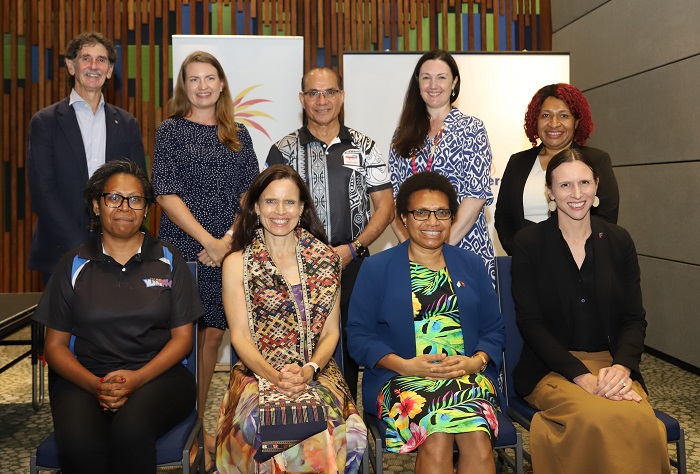Research findings of a landmark study into the effect of family and sexual violence on the performance of companies in Papua New Guinea (PNG) show that taking action to address the problem can improve employee well-being and increase a company's financial performance.
Australia’s Ambassador for Gender Equality, Ms Stephanie Copus Campbell, attended a forum hosted by the International Finance Corporation (IFC) and the Business Coalition for Women (BCFW) at the Hilton Hotel in Port Moresby on 17 August that shared the findings of their two-year study and detailed in the report, Workplace Responses to Family and Sexual Violence in PNG: Measuring the Business Case. The research, made possible by support from the governments of Australia and New Zealand, demonstrates the social and economic benefits that can be achieved by preventing and addressing the harm and suffering caused by family and sexual violence.
The research, from 2020 to 2022, involved a survey of three major companies in PNG to understand better how companies in PNG can support employees affected by family and sexual violence. Initial findings estimated that the cost of family and sexual violence to employers in PNG was almost 10 days of work per employee each year, equating to a financial cost of PGK 7.3 million (US$2.1 million) for participating companies.
“Gender-based violence creates harmful impacts for businesses, including reduced productivity, employee turnover, and reputational damage. Therefore, employees, companies, and the broader society can benefit when businesses implement good practice responses to family and sexual violence and other forms of violence." said Evonne Kennedy, Executive Director of BCFW.
Results from the study show that measures taken by the companies appear to be making a difference, particularly when they respond to family and sexual violence by implementing policies, procedures, and training; and subscribing to support services for victims and survivors. Support measures such as employee counselling and alternative work arrangements help participating companies reduce lost workdays by an average of 1.4 days per employee per year.
“The findings from this important research demonstrate the potential for both social impact and financial gains when the private sector takes action,” said Judith Green, IFC Country Manager for Australia, New Zealand, Papua New Guinea and the Pacific Islands. “It’s distressing that women in Papua New Guinea experience violence at twice the global rate and I’m hopeful to see businesses stepping up and showing leadership by adopting measures to address family and sexual violence to bring about real change.”
“Working together we can create both equal opportunities and achieve equal treatment for women in the workforce. I am greatly encouraged at the leadership in the private sector to address gender equality and to combat gender-based violence.” Said PNG Minister for Labour and Employment, Kessy Sawang.
Reflecting on the findings of the report, Ms Stephanie Copus Campbell said, “Gender-based violence hurts everyone, including the private sector. This is a call-to-action for employers and business leaders. It is possible for workplaces to have a positive impact on family and sexual violence and these research findings set out practical steps and examples that others can follow.”
For further information, including access to related materials, please contact the Australian High Commission Public Diplomacy team: +675 7090 0100

